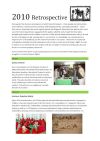
“It has been an amazing year for livestock keepers”, says LPP’s Ilse Koehler-Rollefson. “They have fought for their rights, all with the aim of bringing one big message across: our knowledge, our commitment, are important for rural livelihoods, for the environment and for consumers.”
Read her summary of the year’s events.
